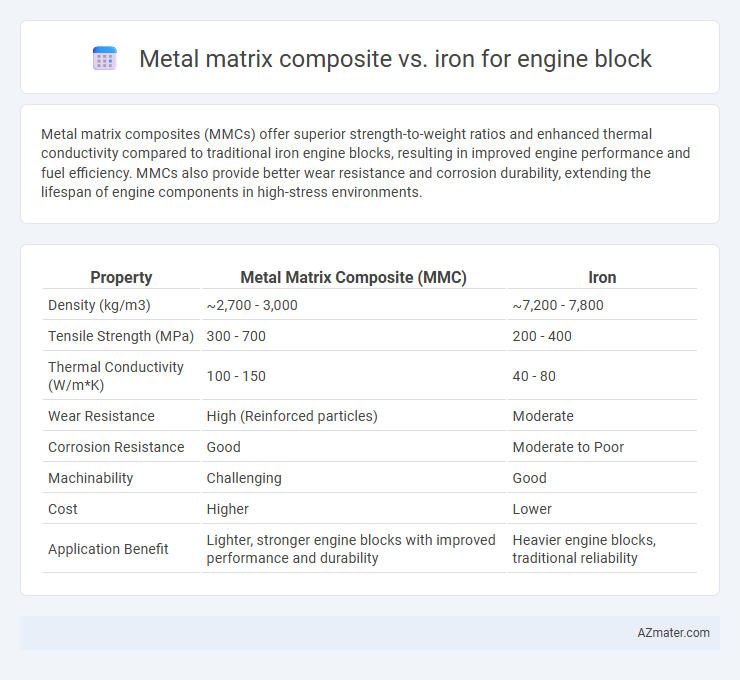Metal matrix composites (MMCs) offer superior strength-to-weight ratios and enhanced thermal conductivity compared to traditional iron engine blocks, resulting in improved engine performance and fuel efficiency. MMCs also provide better wear resistance and corrosion durability, extending the lifespan of engine components in high-stress environments.
Table of Comparison
| Property | Metal Matrix Composite (MMC) | Iron |
|---|---|---|
| Density (kg/m3) | ~2,700 - 3,000 | ~7,200 - 7,800 |
| Tensile Strength (MPa) | 300 - 700 | 200 - 400 |
| Thermal Conductivity (W/m*K) | 100 - 150 | 40 - 80 |
| Wear Resistance | High (Reinforced particles) | Moderate |
| Corrosion Resistance | Good | Moderate to Poor |
| Machinability | Challenging | Good |
| Cost | Higher | Lower |
| Application Benefit | Lighter, stronger engine blocks with improved performance and durability | Heavier engine blocks, traditional reliability |
Introduction to Engine Block Materials
Metal matrix composites (MMCs) are engineered materials composed of a metal matrix reinforced with ceramic particles or fibers, offering superior strength-to-weight ratio, enhanced thermal conductivity, and improved wear resistance compared to traditional cast iron. Cast iron, historically favored for engine blocks due to its excellent castability, damping properties, and cost-effectiveness, suffers from higher density and lower thermal efficiency. The transition from iron to MMCs in engine block applications addresses the demand for lightweight engines with enhanced performance, fuel efficiency, and durability under high thermal and mechanical stress conditions.
Overview of Metal Matrix Composites (MMCs)
Metal Matrix Composites (MMCs) consist of a metal matrix embedded with ceramic or other reinforcing materials, offering superior strength-to-weight ratios compared to traditional iron engine blocks. MMCs provide enhanced thermal conductivity, corrosion resistance, and wear resistance, improving engine efficiency and durability. Their lower density and higher stiffness make MMCs an optimal choice for high-performance and lightweight automotive engine components.
Properties of Iron in Engine Blocks
Iron used in engine blocks offers excellent wear resistance, high tensile strength, and superior damping capacity, enabling it to withstand the mechanical stresses and vibrations during engine operation. Cast iron's thermal conductivity and thermal expansion properties help maintain engine stability under varying temperatures, reducing the risk of deformation and cracking. Its machinability and cost-effectiveness make iron a preferred material for traditional engine block manufacturing despite the growing interest in lightweight alternatives like metal matrix composites.
Comparative Strength and Durability
Metal matrix composites (MMCs) offer superior strength-to-weight ratios compared to traditional iron engine blocks, enhancing performance and fuel efficiency. MMCs exhibit excellent wear resistance and thermal stability, leading to improved durability under high-stress engine conditions. Iron engine blocks provide robust castability and cost-effectiveness but suffer from higher weight and lower fatigue resistance relative to MMCs.
Weight and Density Differences
Metal matrix composites (MMCs) used in engine blocks offer significantly lower density compared to traditional iron, reducing overall weight and improving fuel efficiency. While iron typically has a density around 7.8 g/cm3, MMCs based on aluminum or magnesium matrices can have densities as low as 2.6 to 3.0 g/cm3, resulting in up to 60% weight reduction. This weight advantage enhances vehicle performance by decreasing mass without compromising the engine block's strength and thermal stability.
Thermal Conductivity and Heat Management
Metal matrix composites (MMCs) outperform traditional iron in engine blocks by offering superior thermal conductivity, which enhances heat dissipation and prevents overheating during high-performance operations. MMCs typically combine aluminum or magnesium matrices with ceramic reinforcements, resulting in lower density and higher thermal conductivity compared to iron's relatively lower heat transfer capabilities. Improved heat management in MMC engine blocks translates to greater engine efficiency, reduced thermal expansion, and increased durability under thermal stress.
Wear Resistance and Longevity
Metal matrix composites (MMCs) used in engine blocks exhibit superior wear resistance compared to traditional iron due to their reinforced ceramic particles, which significantly reduce surface degradation under high-friction conditions. This enhanced wear resistance results in prolonged engine block longevity by maintaining structural integrity and dimensional stability over extended operating periods. Iron, while durable, typically experiences higher wear rates that can lead to increased maintenance and reduced service life in harsh engine environments.
Manufacturing Challenges and Cost Considerations
Metal matrix composites (MMCs) in engine blocks present manufacturing challenges such as complex casting processes, tool wear due to abrasive reinforcements, and difficulty in achieving uniform particle distribution. Iron engine blocks benefit from established, cost-effective foundry methods with high machinability and predictable thermal expansion but lack the weight and performance advantages of MMCs. Cost considerations show MMCs incur higher initial expenses due to specialized materials and processing, while iron maintains lower production costs and widely available supply chains.
Performance Impact in Automotive Applications
Metal matrix composites (MMCs) offer superior strength-to-weight ratios and enhanced thermal conductivity compared to traditional iron engine blocks, resulting in improved engine efficiency and fuel economy. The reduced weight of MMC engine blocks contributes to better vehicle handling and acceleration while maintaining structural rigidity under high thermal and mechanical stresses. MMCs also exhibit increased wear resistance and lower thermal expansion, leading to extended engine lifespan and reduced maintenance in demanding automotive environments.
Future Trends in Engine Block Material Innovation
Metal matrix composites (MMCs) exhibit superior strength-to-weight ratios and thermal conductivity compared to traditional iron, driving future trends in engine block materials toward lightweight, high-performance options. Advancements in MMC manufacturing, such as nanoparticle reinforcement and additive manufacturing techniques, are enhancing durability and heat resistance, crucial for next-generation engines. The shift toward electric and hybrid vehicles further accelerates the adoption of MMCs due to their potential for weight reduction and improved thermal management, optimizing overall engine efficiency.

Infographic: Metal matrix composite vs Iron for Engine block
 azmater.com
azmater.com